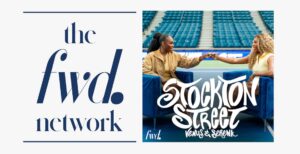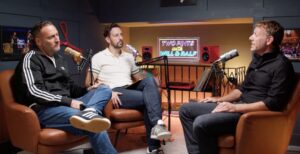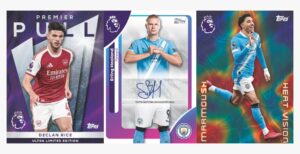Creating a hit podcast is difficult, if not near impossible in such a competitive market, but Dr Marshall Poe gives his opinion on how success might be achieved.
Dr Poe is an American historian and writer, who has taught at Harvard University, Columbia University, the University of Iowa, and the University of Massachusetts Amherst. He also served as a writer and editor at The Atlantic. Today, he is founder and editor of the New Books Network, a lineup of author-interview podcast channels dedicated to public education, reaching close to 1.5 million downloads per month.
He writes: 2023 was a bad year for the podcast industry. Companies closed, podcasters lost their jobs, and big media companies lost a lot of money on bad bets. The trade publications were full of gloom and doom. Even the mainstream media covered the podcasting “bloodbath.” Reading all this, you might think that podcasting is at death’s door.
It’s not. But why? Because rank-and-file podcasters are still hard at work and will remain so. Not household names. Not stars. Not media darlings. Not even the fine people at the NYT, NPR and the BBC who produce podcasts.
These high profile (and well-funded) podcasters want to produce hits. They want the next Joe Rogan or the next Serial. And I wish them luck. They will need it, because making hits appears to be very hard.
That’s not what the rank-and-file podcaster is about. Rank-and-file podcasters are not dumb. They know they cannot produce hits. Who can compete with the NYT, NPR or the BBC? But they don’t care because hit-making is the farthest thing from their minds.
What they want to do is produce a show that serves the needs of a specific audience, probably a small or “niche” with particular interests. They carefully curate the content of the show to enlighten and entertain that audience. They talk about things of interest to that audience. They interview people who understand the peculiarities of that audience. They serve their core constituency, not the mass of people.
This approach is called “narrowcasting.” The word is not new; the first use was apparently in 1932. But for whatever reason it never really caught the public’s imagination and never entered into popular use. Probably because there was so little of it.
The 20th century was the great era of broadcasting: CBS, NBC, ABC, PBS and radio stations galore. All these media sent a few signals to millions upon millions of households indiscriminately. You only needed a TV or radio. What you got is what they sent. To exaggerate a bit, we all watched or listened to the same things, the things the big broadcasting companies chose for us.
It is hardly news that the internet badly damaged, if not destroyed, the broadcasting model. Rather suddenly, the broadcasters lost their monopoly on signal sending. The cost of sending signals to masses of people fell through the floor. This happened first with text (blogs), then with video (YouTube), and then with audio (podcasting), all within about 20 years.
This new media dispensation meant that pretty much anyone could send a text, video, or audio signal to masses of people at very low cost.
The struggle of traditional media companies (the broadcasters of old) to adapt to this new mediascape and the appearance of new “digital first” media companies became front page news. Essentially, the traditional media companies began covering themselves and their own plight.
Will this big media company survive? What is this big media company doing “online?” Is this big media company going to “disrupt” this or that industry?
In their self-regard – and that of a lot of media journalism – they missed the story, or at least an important part of it. It’s not about big media companies, traditional or otherwise. It’s about narrowcasting, at least in podcasting.
For the first time in history there are thousands upon thousands of “audio channels” distributing “content” that it tailored to the needs of specific audiences. No more “one size fits all.” What we have now in podcasting is “customised and tailor-made.”
Regular podcasters have proved masterful at producing this targeted, useful content to their communities. I’ve called them “audiences,” but a better term might be “communities of interest.”
These are people who share an interest in and passion for something that is, by the lights of the “man on the street” pretty obscure. The “man on the street” has no interest in them, but to a community member, they are gold.
I run a public education podcast network that serves many of these “communities of interest.” In my case, the general category is “books.” We do author interviews, that’s it. But there are many kinds of books about many different things.
No two readers are likely (outside certain “bestseller” exceptions) interested in the same kind of book. A reader of military history is not likely to been keen on books about religion. A reader excited about political science is not likely to be interested in books about popular culture.
I knew this, so I designed my network to cater to the interests of each of these communities (military history, religion, political science, popular culture) specifically. They get interviews with the authors of books that they are interested in, not others.
In other words, I – like thousands of other podcasters – narrowcast. I am not interested in attracting a huge audience, something that is basically impossible in any case. What I am interested in is serving the needs of these communities, in educating them, in entertaining them, in giving them a rewarding way to pass the time. That is an end in itself.
But what about money? Call me a fool, but I never cared about it very much. I ran my network for about 10 years and never made a dime. I had a job and it was cheap to operate. What I got in return was a lot of love from the authors we interviewed, the presses who published their books, and, of course, the audience. I also got a sense of accomplishment. My network was designed to educate the public (or, rather, a lot of little publics) and that’s what it does.
Eventually I was presented with the opportunity to make money from the network. This is not the way I thought about it. What I thought (and still think) is “This money will enable me to make the network sustainable in the long term.” Eventually I am going to die, or at least get really tired. The money meant that the network and its mission could live on. I took the money and still take it.
But it was always about the mission, and I bet that’s the case for most podcasters. We are not in it to get rich. We’ll leave that to the biggies. We need enough money to continue doing what we’re doing, which is serve our communities of interest. Would I continue to do it even if the money dried up? Probably. I did it before. Can the big media companies say the same?
Dr Poe told PodcastingToday: “The remarkable thing about podcasting isn’t Joe Rogan. It’s that there are now excellent podcasts for plumbers by plumbers, and podcasts by medieval Russian historians for anyone who’s interested – and it turns out many are.”






